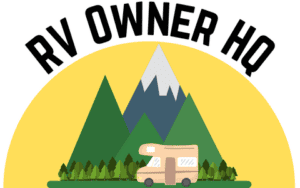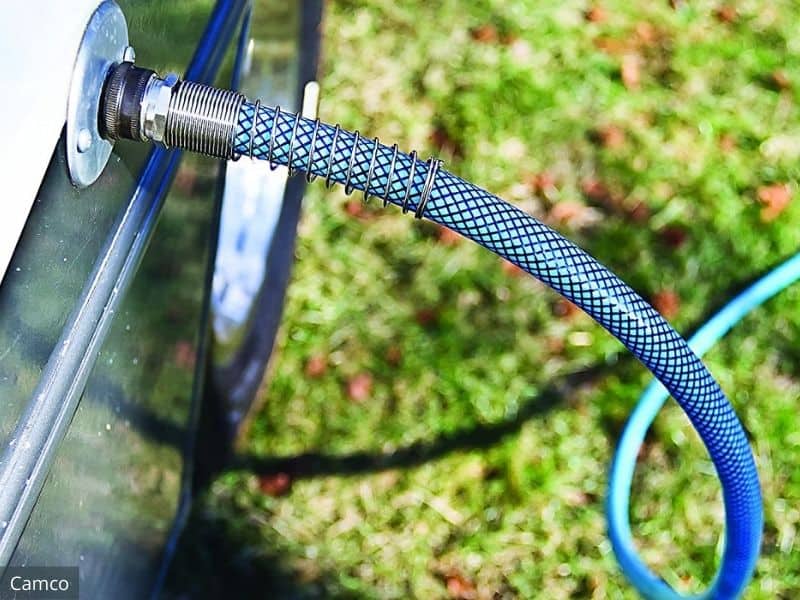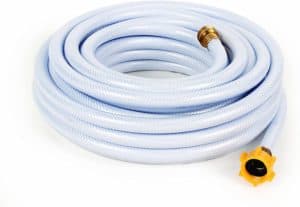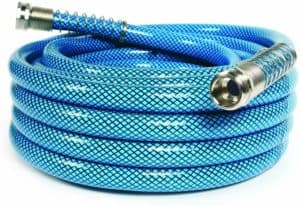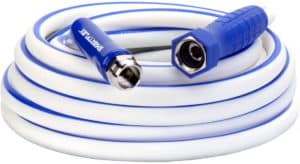One of the most important RV accessories that every RVer needs to invest in is a good quality RV water hose.
Because while it might be tempting to just use any old garden hose you have laying around the house.
There are several key reasons why this isn’t a good idea, which we’ll discuss in just a few moments.
But you might be wondering, if not a garden hose, then what type of hose should I use for my RV?
Well, luckily we’ve got the answer to this popular question as well answers to several others around RV water hoses below.
Do I Need a Special Water Hose for RVs?
You should never use a standard garden hose for your RV water hose and instead should always use either an RV or marine hose intended for freshwater, which tends to be either blue or white.
But why is that?
Why can’t you just use a standard garden hose for your RV?
Well, it turns out for quite a few reasons, which we’ve listed below.
Why You Should Never Use a Garden Hose for Your RV Water Hose
- Not rated for potable water, which is a fancy way of saying they’re not rated for drinking water.
- Can transmit lead, mold, and mildew.
- They can leech chemicals into the water.
- Can cause the water in your RV to taste and or smell bad.
What Makes an RV Water Hose Different from a Standard Garden Hose?
An RV water hose is designed specifically for freshwater and drinking water and has several key differences compared to a standard garden hose, which we’ve listed below.
- Designed to be safe for potable or freshwater.
- In North America, they are required to be certified by National Sanitation Foundation (NSF), American National Standards Institute (ANSI), and CAN 61 as safe for drinking water.
- Are BPA-free, lead-free, and phthalate-free.
- Typically thicker than a standard garden hose with more robust fittings.
- Often features strain-relief ends for increased durability.
- Usually more resilient to UV light, which increases the longevity of the hose.
What is the Best RV Water Hose?
There are many good water hoses on the market today that are designed specifically for RVs and camping.
But the below three are some of the best and most popular RV water hoses on the market today.
1. Camco TastePURE Drinking Water Hose
Quick Specs
- Length: 50 Feet
- Diameter: 1/2 Inch
- Drinking-Water Safe NSF Certified Hose
- Made from BPA Free PVC
- Compliant with All Federal and State Low Lead Laws
- CSA Low Lead Content Certified to NSF/ANSI 372
2. Camco Premium Drinking Water Hose
Quick Specs
- Length: 35 Feet
- Diameter: 5/8 Inch
- Drinking-Water Safe NSF Certified Hose
- 20% Thicker with Machine Fittings and Strain-Relief Ends for Added Durability
- Lead-Free, BPA-Free, Phthalate-Free
- UV Stabilized for Longer Life
- Compliant with All Federal and State Low Lead Laws
- CSA Low Lead Content Certified to NSF/ANSI 372
3. SmartFlex RV/Marine Hose
Quick Specs
- Length: 25 Feet
- Diameter: 5/8 Inch
- Drinking-Water Safe
- Lead-Free
- Extremely Flexible, Even in Cold Weather
- Features a Durable and Abrasion Resistant Outer Cover Made from Hybrid Polymer
- Won’t Kink Under Pressure
How Long Should an RV Water Hose Be?
An RV water hose should ideally be at least 25 feet and no more than 50 feet.
As this range in length will handle the majority of RV hookup situations, while still keeping the hose small enough so that it’s easy to manage and store.
However, there is often debate in the RV community on how long an RV water hose should be.
As some RVers prefer to have one 50-foot hose that can handle almost any hookup situation.
While others prefer to have a couple of shorter RV water hoses, such as a 25-footer and a 35-footer, and even a 10-footer, to give them more flexibility.
As this allows them to use a shorter hose when the situation permits.
While still giving them the ability to reach more distant water connection points, by connecting or stringing together several shorter hoses.
Do I Need to Attach a Water Filter to My RV Water Hose?
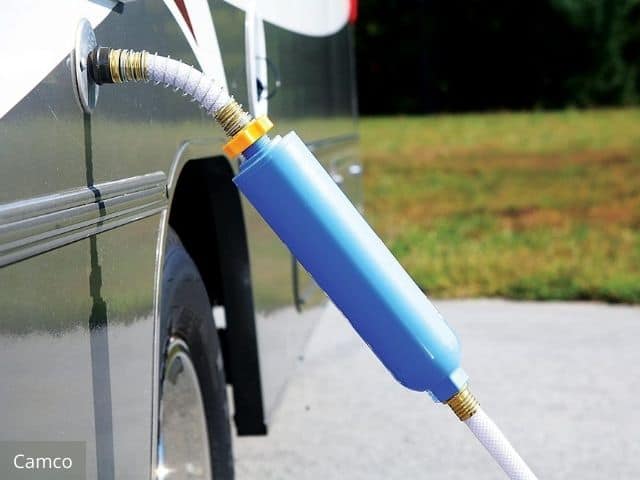
While it’s not mandatory to connect a water filter to your RV water hose, most RVers opt to do so, and it’s generally recommended.
Because while most campgrounds and RV park water sources are classified as safe for drinking, unless posted otherwise.
Public and private water sources, such as municipal water or well water, which is where the majority of campgrounds and RV parks get their water from are not all created equal.
As these water sources can often leave a lot to be desired when it comes to purity, chemical contaminants, metal contaminants, taste, and smell, despite being classified as “safe for drinking”.
As municipal water sources according to the water quality association can contain contaminants such as:
- Aluminum
- Ammonia
- Arsenic
- Bacteria
- Fluoride
- Heavy Metals
- Lead
- Nitrates
- Mercury
- Radium
While well water sources according to the United States Environmental Protection Agency can contain contaminants such as:
- Microorganisms
- Nitrates
- Heavy Metals
- Organic Chemicals,
- Radionuclides
- Fluoride
In addition, both municipal and well water can contain suspended solids, sand, silt, and other sediments, which can damage your RV plumbing system, appliances, and plumbing fixtures over time.
So while connecting a water filter to your RV water hose is not absolutely necessary, it’s definitely a best practice, to further filter and purify the water coming into your RV.
To see the most popular and top-selling inline RV water filter on Amazon click here.
How Do You Keep an RV Water Hose Containment Free and Safe for Drinking?
While an inline RV water filter can go a long way to keep your RV water hose and the water coming into your RV containment free and safe for drinking.
There are several other best practices you can use beyond just an RV water filter to further sanitize and keep the water coming into your RV safe for drinking, which we’ve highlighted below.
- Before storing an RV water hose, connect the two ends of the hose together to prevent dirt and contaminants from getting inside the hose.
- Periodically sanitize the hose ends by spraying the connection points with a solution of nine parts water to one part bleach. Before thoroughly rinsing the connection points with pure water.
- Spray down the campsite faucet with the same 9 parts water 1 part bleach solution and then run some water through it, before connecting the RV water hose to the campsite water hookup.
- Store all RV freshwater hoses as well as any filters and fittings in a separate sealed bin or plastic container.
- If your RV has a black water flush, always use a separate dedicated hose for the black water flush.
- To prevent cross-contamination between the RV sewer hose and freshwater hose always use gloves when handling the sewer hose and sanitize your hands afterward.
- Keep the hose ends and connection points off the ground and out of the dirt.
- Sanitize your RV freshwater holding tank twice a year, with 1 cup bleach and a thorough flush and rinse.
How Often Should You Change Your RV Water Hose?
Quality RV water hoses should last for at least 10 years or more, as long as they’re properly cared for.
And do not need to be replaced unless the connection points have been damaged or they’re leaking.
You might be wondering though, how do you properly care for an RV water hose?
So to answer this question, we’ve listed all the best practices for RV water hoses below, to ensure you get the maximum amount of life out of the hose.
How to Store and Properly Care for an RV Water Hose
- Use a 90-degree hose elbow fitting to reduce stress on the connection point where the hose connects to the RV.
- Use an inline water pressure regulator to keep the water pressure in the hose as well as in the RV at a safe consistent 40 to 50 pounds of pressure to prevent stress or damage to the hose and your RV plumbing system.
- Keep the hose out of the sun whenever possible, as UV damage can greatly shorten its life expectancy.
- Before storing an RV water hose long term ensure that the hose is completely dry and clean to prevent mold and mildew growth inside the hose.
- Try to avoid extreme heat or cold when storing an RV water hose long-term, as this can stress and reduce the life of the hose.
Can You Use an Expandable Water Hose for an RV?
Expandable water hoses are a popular choice for many RVers, as they provide several unique benefits over more traditional water hoses.
As they’re easier to work with, lighter and more compact, easier to store, won’t kink, and don’t become stiff and unmanageable in cold weather.
However, while expandable water hoses can be used for RVs, it’s important that you choose an expandable water hose designed specifically for RV or marine use, that’s safe for drinking water, such as the Zero-G RV and Marine Hose.
Because like traditional hoses, there are many types of expendable water hoses on the market today that are designed for a variety of applications, such as gardening and general use, which are generally not rated for drinking water.
So if you choose to go with an expandable water hose for your RV, as opposed to a traditional water hose, make sure you purchase one rated for RV or marine use, which like traditional RV water hoses tend to be either blue or white.
To see the most popular expandable water hose, rated for RV and marine use on Amazon click here.
Additional Resources:
For more information on RV water hoses, check out our article “Should You Buy a 1/2 or 5/8 Inch RV Water Hose?“.
To see our best RV tips, check out our article “20 Important Beginner RV Tips No One Tells You“.
Recent Posts
When cruising down the highway in your RV, the last thing you want is a tire blowout! Not only is it dangerous, but RV tire replacement isn't cheap, costing $200 to $300 per tire. The good news,...
Nothing ruins an RV adventure faster than a breakdown with no way to fix it. Because of this, every RVer should have a well-stocked RV tool kit for those unexpected roadside emergencies and campsite...
